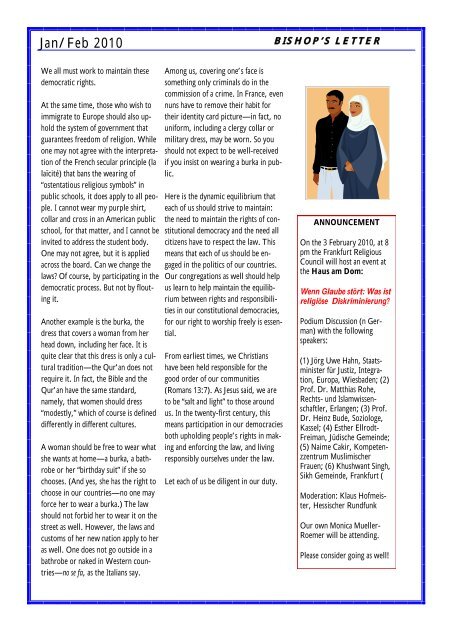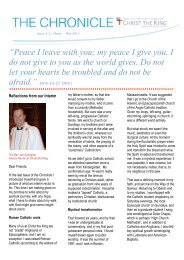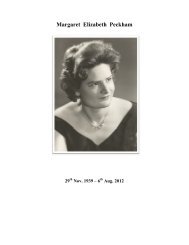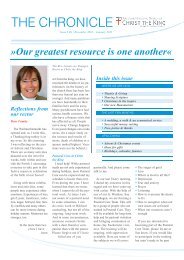UPCOMING: LADIES' RETREAT FROM 15-16 ... - Christ the King
UPCOMING: LADIES' RETREAT FROM 15-16 ... - Christ the King
UPCOMING: LADIES' RETREAT FROM 15-16 ... - Christ the King
Create successful ePaper yourself
Turn your PDF publications into a flip-book with our unique Google optimized e-Paper software.
Jan/Feb 2010<br />
We all must work to maintain <strong>the</strong>se<br />
democratic rights.<br />
At <strong>the</strong> same time, those who wish to<br />
immigrate to Europe should also uphold<br />
<strong>the</strong> system of government that<br />
guarantees freedom of religion. While<br />
one may not agree with <strong>the</strong> interpretation<br />
of <strong>the</strong> French secular principle (la<br />
laïcité) that bans <strong>the</strong> wearing of<br />
“ostentatious religious symbols” in<br />
public schools, it does apply to all people.<br />
I cannot wear my purple shirt,<br />
collar and cross in an American public<br />
school, for that matter, and I cannot be<br />
invited to address <strong>the</strong> student body.<br />
One may not agree, but it is applied<br />
across <strong>the</strong> board. Can we change <strong>the</strong><br />
laws? Of course, by participating in <strong>the</strong><br />
democratic process. But not by flouting<br />
it.<br />
Ano<strong>the</strong>r example is <strong>the</strong> burka, <strong>the</strong><br />
dress that covers a woman from her<br />
head down, including her face. It is<br />
quite clear that this dress is only a cultural<br />
tradition—<strong>the</strong> Qur’an does not<br />
require it. In fact, <strong>the</strong> Bible and <strong>the</strong><br />
Qur’an have <strong>the</strong> same standard,<br />
namely, that women should dress<br />
“modestly,” which of course is defined<br />
differently in different cultures.<br />
A woman should be free to wear what<br />
she wants at home—a burka, a bathrobe<br />
or her “birthday suit” if she so<br />
chooses. (And yes, she has <strong>the</strong> right to<br />
choose in our countries—no one may<br />
force her to wear a burka.) The law<br />
should not forbid her to wear it on <strong>the</strong><br />
street as well. However, <strong>the</strong> laws and<br />
customs of her new nation apply to her<br />
as well. One does not go outside in a<br />
bathrobe or naked in Western countries—no<br />
se fa, as <strong>the</strong> Italians say.<br />
Among us, covering one’s face is<br />
something only criminals do in <strong>the</strong><br />
commission of a crime. In France, even<br />
nuns have to remove <strong>the</strong>ir habit for<br />
<strong>the</strong>ir identity card picture—in fact, no<br />
uniform, including a clergy collar or<br />
military dress, may be worn. So you<br />
should not expect to be well-received<br />
if you insist on wearing a burka in public.<br />
Here is <strong>the</strong> dynamic equilibrium that<br />
each of us should strive to maintain:<br />
<strong>the</strong> need to maintain <strong>the</strong> rights of constitutional<br />
democracy and <strong>the</strong> need all<br />
citizens have to respect <strong>the</strong> law. This<br />
means that each of us should be engaged<br />
in <strong>the</strong> politics of our countries.<br />
Our congregations as well should help<br />
us learn to help maintain <strong>the</strong> equilibrium<br />
between rights and responsibilities<br />
in our constitutional democracies,<br />
for our right to worship freely is essential.<br />
From earliest times, we <strong>Christ</strong>ians<br />
have been held responsible for <strong>the</strong><br />
good order of our communities<br />
(Romans 13:7). As Jesus said, we are<br />
to be “salt and light” to those around<br />
us. In <strong>the</strong> twenty-first century, this<br />
means participation in our democracies<br />
both upholding people’s rights in making<br />
and enforcing <strong>the</strong> law, and living<br />
responsibly ourselves under <strong>the</strong> law.<br />
Let each of us be diligent in our duty.<br />
BISHOP‘S LETTER<br />
ANNOUNCEMENT<br />
On <strong>the</strong> 3 February 2010, at 8<br />
pm <strong>the</strong> Frankfurt Religious<br />
Council will host an event at<br />
<strong>the</strong> Haus am Dom:<br />
Wenn Glaube stört: Was ist<br />
religiöse Diskriminierung?<br />
Podium Discussion (n German)<br />
with <strong>the</strong> following<br />
speakers:<br />
(1) Jörg Uwe Hahn, Staatsminister<br />
für Justiz, Integration,<br />
Europa, Wiesbaden; (2)<br />
Prof. Dr. Matthias Rohe,<br />
Rechts- und Islamwissenschaftler,<br />
Erlangen; (3) Prof.<br />
Dr. Heinz Bude, Soziologe,<br />
Kassel; (4) Es<strong>the</strong>r Ellrodt-<br />
Freiman, Jüdische Gemeinde;<br />
(5) Naime Cakir, Kompetenzzentrum<br />
Muslimischer<br />
Frauen; (6) Khushwant Singh,<br />
Sikh Gemeinde, Frankfurt (<br />
Moderation: Klaus Hofmeister,<br />
Hessischer Rundfunk<br />
Our own Monica Mueller-<br />
Roemer will be attending.<br />
Please consider going as well!





